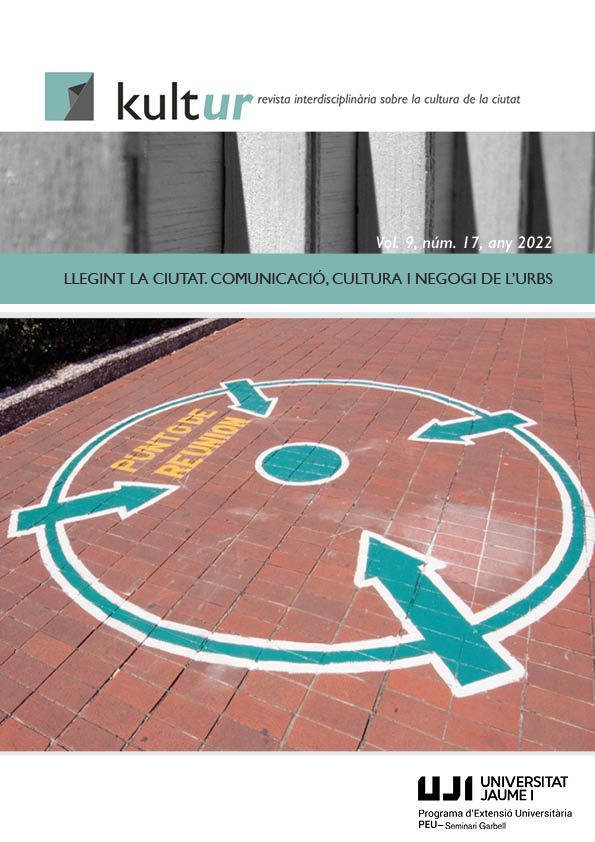Símbolos y democracia en una interpretación de la ciudad
##plugins.themes.bootstrap3.article.main##
Resum
Es proposa ací una reflexió sobre la producció simbòlica de la ciutat i la seua dependència dels espais i temps que en aquesta genera la globalització, dominats per la desigualtat i la tensió inclusió/exclusió. Si la democràcia requereix una base territorial de la sobirania, com s’articula aquesta en els temps fluids del capitalisme cognitiu? Com es planifica en una ciutat travessada pels no-llocs i no-temps de la desigualtat? Les fórmules de la democràcia representativa no poden donar-se prematurament per caducades, quan encara no s’han desenvolupat en tota la seua extensió, quan les experiències de democràcia directa no han mostrat encara les seues capacitats. És temps d’assajar fórmules de democràcia deliberativa basades en ciutadania inclusives.
Descàrregues
##plugins.themes.bootstrap3.article.details##

Aquesta obra està sota una llicència internacional Creative Commons Reconeixement-NoComercial-SenseObraDerivada 4.0.
.png)
Tots els continguts de la revista kult-ur se distribueixen sota una llicència d'ús i distribució Creative Commons Atribució-Compartir Igual 4.0 Internacional (CC BY-SA 4.0), excepte indicació contrària. Pot consultar ací la versió informativa i el text legal de la llicència. La indicació de la llicència d'ús i distribució CC BY-SA 4.0 ha de constar expresament d'aquesta manera quan siga necessari.
Referències
ALCARAZ RAMOS, M. 2019. “Algunes reflexions sobre ética pública, valors, principis constitucionals i educació”. En BOROX LÓPEZ, P. I APARICIO GUADAS, P.: Educació popular, ciutadania i emancipaciò. Xàtiva, L’Ullal eds.
ASCHER, F. 2004. Los nuevos principios del urbanismo. Madrid, Alianza.
AUGÈ, M. 2005. Los no lugares. Espacios del anonimato. Una antropología de la sobremodernidad. Barcelona, Gedisa.
BAUMAN, Z. 2006. Vida líquida. Barcelona, Paidós.
BAUMAN, Z. 2010. Vida de consumo. Madrid, FCE.
BORJA, J. & MUXÍ, Z. 2003. El espacio público: ciudad y ciudadanía. Barcelona, Diputació de Barcelona-Electa.
ELIAS, N. 2010. Sobre el tiempo. México, FCE.
HABERMAS, J. 2010. Facticidad y validez. Sobre el Derecho y el Estado democrático de derecho en términos de teoría del discurso. Madrid, Trotta.
HABERMAS, J. 2017. Historia y crítica de la opinión pública. La transformación estructura de la vida pública. Barcelona, Gustavo Gili.
HABERMAS, J. 2018. Teoría de la acción comunicativa. Madrid, Trotta.
HARVEY, D. 2007. Urbanismo y desigualdad social. Madrid, Siglo XXI.
INNERARITY, D. 2006. El nuevo espacio público. Barcelona, Espasa Calpe.
INNERARITY, D. 2009. El futuro y sus enemigos. Barcelona, Paidós.
INNERARITY, D. 2020. Una teoría de la democracia compleja. Gobernar en el siglo XXI. Barcelona, Galaxia Gutenberg.
JACOBS, J. 2013. Muerte y vida de las grandes ciudades. Madrid, Capitán Swing.
LEFEBVRE, H. 1972. La revolución urbana. Madrid, Alianza.
LEFEBVRE, H. 2013. La producción de espacio. Madrid, Capitán Swing.
LYNCH, K. 2004. La imagen de la ciudad. Barcelona, Gustavo Gili.
MILANOVIC, B. 2020. Capitalismo, nada más. El futuro del sistema que domina el mundo. Madrid, Taurus.
NOGUÉ FONT, J. & VICENTE RUFÍ, J. 2001. Geopolítica, identidad y globalización. Barcelona, Ariel.
RAMONEDA, J. 2010. Contra la indiferencia. Barcelona, Galaxia Gutenberg-Círculo de Lectores.
ROGERS, R. & GUMUCHDJIAN, P. 2003. Ciudades para un pequeño planeta. Barcelona, Gustavo Gili.
ROMERO, J. 2009. Geopolítica y gobierno del territorio en España. València, Tirant lo Blanch.
ROMERO, J. 2011. “La ciudad. Un actor político relevante en el nuevo contexto globalizado”. En: VV.AA. Pensando en Alicante. Ideas para otro modelo de ciudad. Alicante, Plataforma d’Iniciatives Ciutadanes-ECU.
SONGEL, F. 2021. F. El arte de leer las calles. Barlin Libros, València.
THERBORN, G. 2020. Las ciudades del poder. Lo urbano, lo nacional, lo popular y lo global. Madrid, Traficantes de Sueños.
TOMÁS FORNÉS, M. 2002. Unió Europea. El debat sobre l’èficiència i la democracia local. ICPS-Diputació de Barcelona, Barcelona.
VV.AA. 2017. L’Agenda 2030. Full de ruta per a ciutats i pobles de la Comunitat Valenciana. València, Generalitat Valenciana.


